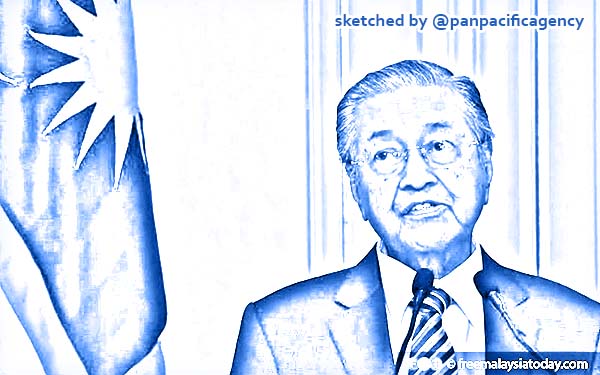Malaysia’s govt adopts new approach to boost economy and put country as a new Asian Tiger

Photo by the Free Malaysia Today. Sketched by the Pan Pacific Agency.
KUALA LUMPUR, Oct 5, 2019, Bernama. Malaysia will adopt a new approach through the Shared Prosperity Vision 2030 (WKB2030) to strengthen the country’s economic performance, Tun Dr Mahathir Mohamad said. The Prime Minister said the initiative would ensure that the people and the country enjoy shared prosperity, reported the Bernama.
The WKB2030 can put Malaysia as a new a Asian Tiger and provide a decent standard of living for all Malaysians by 2030, said Tun Dr Mahathir Mohamad. The Prime Minister said it will give higher value to the country’s economy and make Malaysia a nation that is competitive, of high integrity and with dignity.
“This will make Malaysia regain the trust of the market and investors and be able to place Malaysia as a new Asian Tiger,” the Prime Minister said when launching WKB2030 here today.
He said that over the past decade, the country’s economic management had been radically entrenched towards premature liberalisation and this has led to the aspiration of becoming a developed nation, as envisaged in Vision 2020, not fully realised.
“But being a high-income country does not guarantee fair and equitable distribution of wealth and higher income for the people,” he said in the preface of the WKB 2030 Book authored by the Ministry of Economic Affairs.
The WKB2030 Book was unveiled by Dr Mahathir today.
The Prime Minister said the government is taking a new approach to the country’s economic and social management, whereby the development and progress achieved must be able to bring about shared prosperity.
“In this context, all the people will be able to enjoy significant increases in household income and purchasing power, including narrowing the income and wealth gap between classes, ethnic groups, regions and supply chains,” he added.
He said the economic model of the past decade focused more on increasing national debt for the implementation of mega projects and that the country’s equity ownership was increasingly turning to foreign ownership.
Likewise, economic ownership focused only on several major cities, and at the same time ignored growth, equity ownership, and opportunities for the people in the rural areas.
The Malaysian Labour Force Survey 2018 report shows that semi-skilled and low-skilled workers accounted for 72.8 per cent of the total workforce in the country.
“Now, with various forms of institutional enhancements and reforms being undertaken by the government, I am confident that efforts to champion B40 (bottom 40 per cent of household income group) and the Bumiputera community as a whole will bear fruit,” Dr Mahathir said.